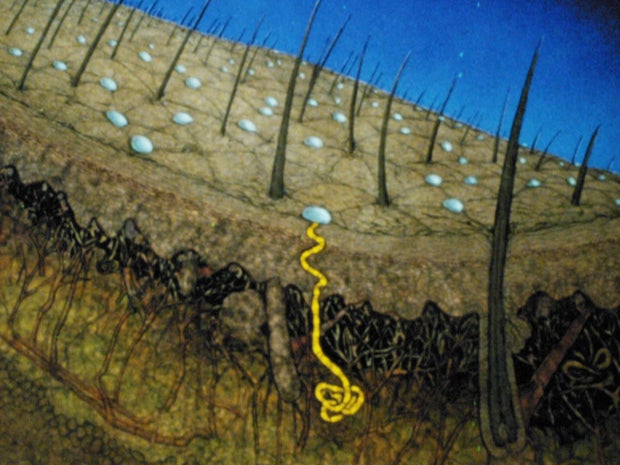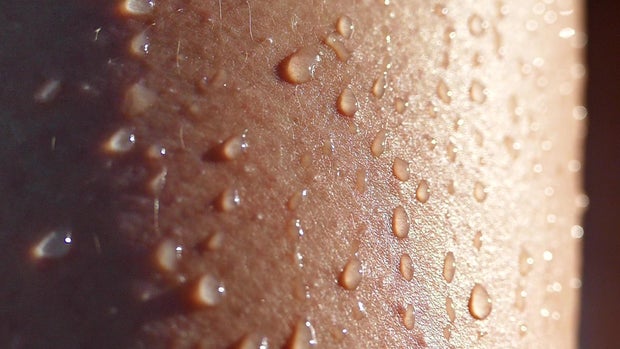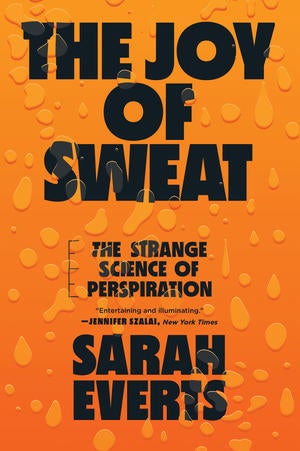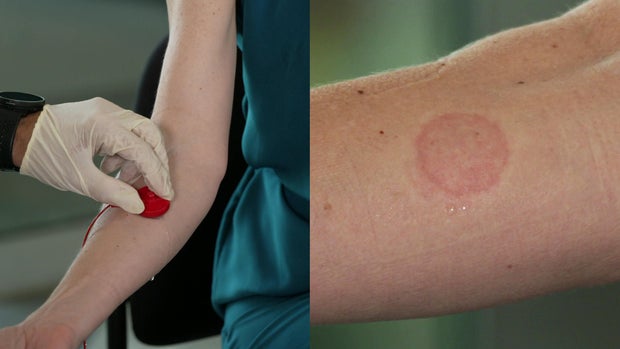Why you sweat, and why that’s a good thing

[ad_1]
We’ve all felt it: At first comes the trickle, and then the flood. It’s embarrassed us, and even torpedoed a presidential campaign. But when was the last time you were grateful for … sweat?
Many are actually squeamish about sweat. Perhaps, said science writer Sarah Everts, because sweating is utterly out of our control. “Think of most other bodily fluids – peeing? Tears? You can usually hold those back to go to a private place to release them. But sweat? No way. You have zero control.”
Everts is the author of “The Joy of Sweat.” When asked why humans sweat, she replied, “Well, we sweat so that we don’t die! Even just a few degrees up is a fever. So, we have to keep our body temperature in a very tight window, and sweat is how we do it.”
During this summer of record-breaking heat, Everts said no other body function is so essential yet so misunderstood.
Salie asked, “What’s in our sweat?”
“Everything, it’s not just salt,” Everts replied. “Because we source sweat from blood, anything that’s circulating in your blood comes out in sweat. So, our blood is very, very salty, and you have lactic acid or vitamins, hormones. It sort of reveals our secrets.”
The myth that you can detoxify by “sweating it out” dates to the ancient Greek doctor Galen, who mistakenly thought that the body excreted superfluous serums as sweat. “Detoxing by sweating is just not a thing,” Everts said. “The way our body works is, you know, you filter the bad stuff in your blood out through your kidneys, and that goes out in your pee.”
Encyclopaedia Britannica
To understand perspiration, first you need a little science lesson. Glands remove water from our blood and secrete it through pores onto the surface of the skin. We have between 2-5 million “eccrine sweat glands” all over the body.
Andrew Best, who teaches of biology at the Massachusetts College of Liberal Arts, has been collecting data to study why there’s such a variation in sweat gland numbers. He offered to measure Salie’s sweat glands, with a “sweat inducer.”
“Your sweat glands can double in size, kind of like a muscle,” Best said. “You work out a muscle, it gets bigger. Sweat glands do that, too. And they can increase how much sweat they make by about 50% as you acclimatize.”
Best said our ability to sweat has played a fundamental role in our becoming human. “I don’t think that’s widely appreciated, but it’s up there with walking on two legs,” he said.
While humans have sweat glands all over, most mammals only have them on their paws, hands or feet. According to Best, “It’s linked with the fight-or-flight response. Having a little bit of moisture on your fingertips gives you better gripping. This evolved in early mammals tens of millions of years ago to give mammals that ability to have a little extra traction in a moment of panic.”
CBS News
And that ancient response still kicks in today when we find ourselves perspiring when we’re nervous. Not only did sweaty hands and feet help us escape our predators; Best says that we have sweat to thank for empowering us as hunters. As sweat glands evolved to spread over increasingly hairless bodies, our meat-eating ancestors could chase down their prey without overheating. While animals could outrun us, humans could “outsweat” them. “And therefore outrun them over a longer distance,” said Best.
It’s why today we can run marathons. Humans are among the rare mammals who sweat to cool themselves. Other animals use different means.
W.W. Norton
“Dogs and many furry animals use their tongue and saliva – they’ll lick themselves and evaporate the heat off that way,” said Best. “But as you can imagine, when you have a big bunch of fur, it’s not as efficient cooling. Some animals will urinate on themselves – seals, for example. Vultures poop on their legs (it’s very watery poop). Bees vomit on themselves. So, the next time you’re on the subway or a bus and you are grossed out by your fellow humans sweating away, just be glad that, you know, it’s just sweat, because they could be peeing and vomiting and licking themselves to stay cool.”
Everts calls sweating a “human superpower” because of its astonishing efficiency as a cooling mechanism.
So, what about the maxim “It’s not the heat, it’s the humidity”?
“If you’re, like, in a desert, you often don’t even notice that you’re sweating, and that is because there is very little water in the air around you,” said Everts. But when there is a lot of moisture in the air, it is harder chemically for evaporation to occur – the air can only contain so much. “It gets harder to cool down when there is a lot of humidity around,” she said.
And as for the saying “Never let them see you sweat”? You can thank the antiperspirant industry’s advertising for that. We buy more than $80 billion worth of antiperspirants every year.
CBS News
Salie did let them see her sweat, all in the name of science. Best measured Salie to have about 103 sweat glands per square centimeter. It turns out she has low sweat gland density. But her glands did produce a lot of sweat.
And Everts reminds us not to feel bad about that: “I kind of think we all need a sweat pep talk. It is this amazing thing that has allowed humans to live anywhere in the world. It also keeps us from dying.”
“Sweat is a miracle?” asked Salie.
“It is! I really wish we would all, you know, find a lot less shame and a lot more joy in sweat.”
For more info:
- “The Joy of Sweat: The Strange Science of Perspiration” by Sarah Everts (W.W. Norton), in Hardcover, Trade Paperback, eBook and Audio formats, available via Amazon, Barnes & Noble and Bookshop.org
- saraheverts.com
- Andrew Best, assistant professor, Biology, Massachusetts College of Liberal Arts, North Adams, Mass.
Story produced by Anthony Laudato. Editor: Chad Cardin.
See also:
[ad_2]



